According to Oakland, California’s Ötzi, their forthcoming album Storm doesn’t wear a costume of existential dread or moroseness. Rather, the darkness presented by their elevated post-punk aesthetic is a direct reflection of their experience as femmes in a world that is often hostile. Nodding to forebears of anarcho punk and goth — Siouxsie and The Banshees, Crass, The Cure, and the like — Ötzi delivers anthemic hooks worthy of ’80s new wave radio hits, but also with enough aggression and raw passionate energy to resonate with listeners who’ve experienced this hostility first-hand, or are in the very least allies or pledge allegiance to counterculture movements.
Since their formation in 2014, Ötzi has toured the world, billing with varied post-punk, punk and indie luminaries including The Chameleons, Deerhoof, Modern English, She Past Away, Zounds, Screaming Dead and The Iconoclast. Storm follows their 2017 debut LP, Ghosts, and marks their first album with Artoffact Records. Storm was recorded and mixed by Stan Wright at Buzz or Howl Studios in Portland, Oregon, mastered by Daniel Husayn at North London Bomb Factory in London, UK, and features cover art created by Ashley Hohman.
In anticipation of Storm’s release, Ghettoblaster caught up with Gina Marie and Akiko Sampson to discuss their initial introduction to punk and feminist ethics, their music and their contemporaries.
How were you first introduced to both punk and feminist ethics and ideas? How has your commitment to these ethics shaped the way that you view and make your music?
Gina Marie: In the early ’90s, while in high school, I started working at a Sanrio store and my co-worker shared all of this really cool underground “riot grrrl” music on our shifts together. I gravitated towards it and got deep into the culture of fanzines, pen pals, homemade recordings and mixtapes. Growing up in the burbs of Oakland I had easy access to Gilman Street, where I saw as many punk shows as I could, including playing my own first show there at a Girl Convention in 1997. I definitely think being a part of this movement gave me the courage to play instruments and express myself through music.
Akiko: I was introduced to feminism through the public library, and from Left Bank Books in Seattle. I was a teenager and my family had just moved so I didn’t have many friends and I read a lot. I ordered books from the library and I looked in their bibliographies until I read pretty much everything there was to read. I got into local city politics after the Rodney King Riots, and joined some activist groups like Queer Nation and ACT UP. Then I found a 7 inch at the record store called “There’s a Dyke In the Pit,” and it had Bikini Kill, Lucy Stoners and Tribe 8 on it. At that point punk and feminism and queer liberation merged for me, and I realized art and activism can and should be the same thing. Both the successes and the failures of previous punk movements have influenced the way we operate, in terms of how we interact with other bands and promoters and how we interact with our audience. We’re always learning and growing and giving ourselves the opportunity to do better.
What are the predominant issues at hand for you personally and how have your attitudes about those leached in to what you’ve accomplished with Storm?
Gina Marie: Writing Storm was a great experience, definitely intense but it was the first time that I worked with bandmates on making something very intentional. We knew the messages we wanted to convey and we worked really hard to express them through these songs.
Akiko: I think what we were going through was all different at the time, but all of us experienced the time we were writing Storm as a period of big changes. For me, I was coming out as a non-binary person and getting more in touch with my own feelings about my gender identity, I was finally addressing traumatic memories that have really affected me until recently, and shedding some grief and baggage.
What feelings or themes were you exploring with Storm? What do you hope that listeners take away from listening to it?
Gina Marie: The recurring theme of the album is change. It’s all about facing your fears and taking the steps needed to allow yourself the love you deserve, and giving yourself the strength to walk away from toxic situations.
Akiko: There are a lot of emotions that go with change, like despair about the current state, anger to incite you to make a change, fear about what the future could bring, hope for something better, love for yourself and for others. Our first album, Ghosts, was more about reflecting on the past, and a lot of it was about loss and regret. This album is about the future, finding your own power, and making a big change for the better.
You’ve had a lineup addition or two since the previous record, correct? Can you tell us about your new collaborators and what they are bringing to the table?
Akiko: We waited a long time for the right guitarist to come along! We started working with Dylan about two years ago, went on some tours, and the three of us wrote the Storm album together. Winter played saxophone on one of the tracks, “Scorpio,” and was there for all of the album recording. Later, we wanted my synth lines to be played live too, so we brought Winter on as a synth player initially. Now, depending on the song she might play guitar, synth, or sax. With the four of us, though we have varied tastes, we all typically agree on what works and what doesn’t, so songwriting moves quickly and feels inspired. And I think the balance of our personalities works well.
“Hold Still” is, for all intents and purposes, a love song, but not in the traditional sense of a love song, right? What is that about?
Gina Marie: It’s about the kind of love you have for that one person who gets you through the day. For me, that person is my amazing daughter.
Akiko: It’s about supportive love. When we wrote the lyrics, there were a lot of fires going on in California, a lot of death and trauma. And I realized that the only kind of love I can relate to as being meaningful is love that holds space and supports you in the worst times. And that kind of love can be offered to anyone — between lovers, parent and child, teacher and student, or between friends. I thought of my partner, but Gina Marie thought of her daughter. And it’s the same thing. It’s just love.
How did the concept for that video come about?
Gina Marie: We wanted to show ourselves in a way that we hadn’t done before, and that was us just having fun together and enjoying each other’s company. It was the last time we all hung out before the shelter-in-place started so I’m really glad we got to spend the day together filming in Santa Cruz.
Akiko: We thought, it’s a love song, so how can we depict love? How can we show ourselves being happy? For a band like us, it can be a challenge! We’re all fans of the Lost Boys so when Gina Marie suggested the boardwalk, we were all stoked. We all got to nerd out about the locations and scenes we were referencing. And Gina Marie’s daughter has been pretty patient at times in waiting for us to get out of band practice, so it was nice to be able to treat her to some rides and cotton candy and to include her in the video.
“Moths” is another single that you released in anticipation of the record’s release. What is that about? What kind of metamorphosis is at work in your life at present?
Gina Marie: It’s about metamorphosing into our best selves. For me it’s about the constant growth as a person, as a mother, as musician, as a friend. I think a lot of people can relate to the lyric “waiting, waiting, waiting for more.”
Akiko: For me, it felt like more of a spiritual thing of getting closer to and communing with actual, literal moths. I didn’t know why I was getting so into them. As we worked on the lyrics, I kept thinking about things from their perspective. Do they know that they’re changing? Can they feel it? When they change, do they remember their life from before? After it was done, I realized it also felt very much like an analogy to the process of coming out as trans or non-binary, and I had come out as non-binary not long before we wrote it. So between that and what Gina Marie relates it to, I think yes, it’s basically about trying to be the version of yourself that feels right.
Oakland seems to have a pretty thriving and well documented scene, especially as of the last few years. Who are your comrades in that scene? Who is blowing your mind with their art at present?
Gina Marie: My bandmates in Ötzi are always blowing my mind with their other projects like Akiko’s record label Psychic Eye, Winter’s other band Mystic Priestess, plus people we share space with like photographer Kevin Brown, artist and tattooer Gustavo Martinez, bands like Sectarian Bloom, Esses and many more.
Akiko: I spend about an equal amount of time in the noise, punk, and goth scenes so I have lots of different inspirations: Maya Songbird, V.E.X., Scissoring, Malocculsion, Dès Vu, Altar de Fey are ones that come to mind right now. Of course we chill with Gina Marie’s other band Adrenochrome. I love Ratskin Records and the activist art programming at Pro Arts Gallery. But Oakland is so dense with creative, awesome people that I’ll often run into other bands or visual artists I love just by walking my dog around the block. Winter and Sierra from Mystic Priestess live two blocks away, Chani from Straight Crimes is three houses down, and Zachary Watkins formerly from Black Spirituals practices across the street. It’s pretty tight.
It is probably unprecedented to be headed into an album cycle with all the venues and record stores shuttered. Have you considered pushing the release date back? What are the pros and cons to being in this bizarre position?
Akiko: We promised this record to our fans forever, and we recorded it quite a while ago. Some of our biggest fans are doctors and nurses in Italy, treating COVID-19 patients. They watch endless amounts of patients and even co-workers fall ill, often pass away, and then go home in isolation just to sleep. And I know, because they told me, that the only thing that gets them through the day is music. And this is only two of our fans. There are also teachers, mental health workers, homeless outreach volunteers that I know who like our music. So why not just give it to them? If the one thing I can do is support someone who shoulders such a large burden for humanity with something as abstract as music, then that’s the least I can do. So no, we never once considered delaying the release.
As far as pros and cons go, I have to really stretch to find the pros. What we’re really looking at is the music industry kind of collapsing right now. A lot of bands are used to labels and agents and all this machinery doing things for them, but that infrastructure is disintegrating. As an underground, DIY band, well we never depended on any of that anyway. So we’re lucky that we can mostly rely on the same channels we’ve always used, and those are still wide open.
Another upside to the lockdown is that DIY media has really exploded in the past month, from IGTV interviews to blogs to new video series to self-released music to shared illustrations. And people don’t need all the gloss and branding that made something “real” before. People are into content right now, which is rare. And people seem more willing to check out stuff they haven’t heard of. So that’s a good thing for underground bands and for publishers like Ghettoblaster. By the way, did you know I used to be a writer for Ghettoblaster like 10 years ago? So yeah, I’m very glad when I see people paying more attention to media that’s made with heart and passion.
What have you been doing to pass the time during the quarantine/stay-at-home order? Do you feel like you’ve been more lethargic or productive during this time?
Akiko: I don’t know, I’ve felt very lethargic, but I think I’ve been productive anyway? Aside from trying to get this Ötzi album out there, I released a V.E.X. album on my label Psychic Eye, I signed up as a volunteer for Bay Area Girls Rock Camp. I started a webzine called Cryptic Species to have more dialogue, because I missed talking to people at shows. I’ve been teaching voice and piano lessons to people on video chat, and I do it for free for people that can’t pay. I started an edible garden in the tiny outdoor space I have, out of old bookshelves and egg crates and trash. I’m going to distribute seedlings of edible plants all over Oakland, so people can grow food for themselves and for the outreach organizations that serve houseless people. But I’ve also been really psyched about taking naps and sleeping as much as I want. I want to get the capitalist indoctrination that tells us we can never rest out of my system. I see this whole quarantine, in some ways, as just a resting period for society. And sometimes rest is the most productive thing there is.
Pre-order Storm here.
Photo by Kevin Brown


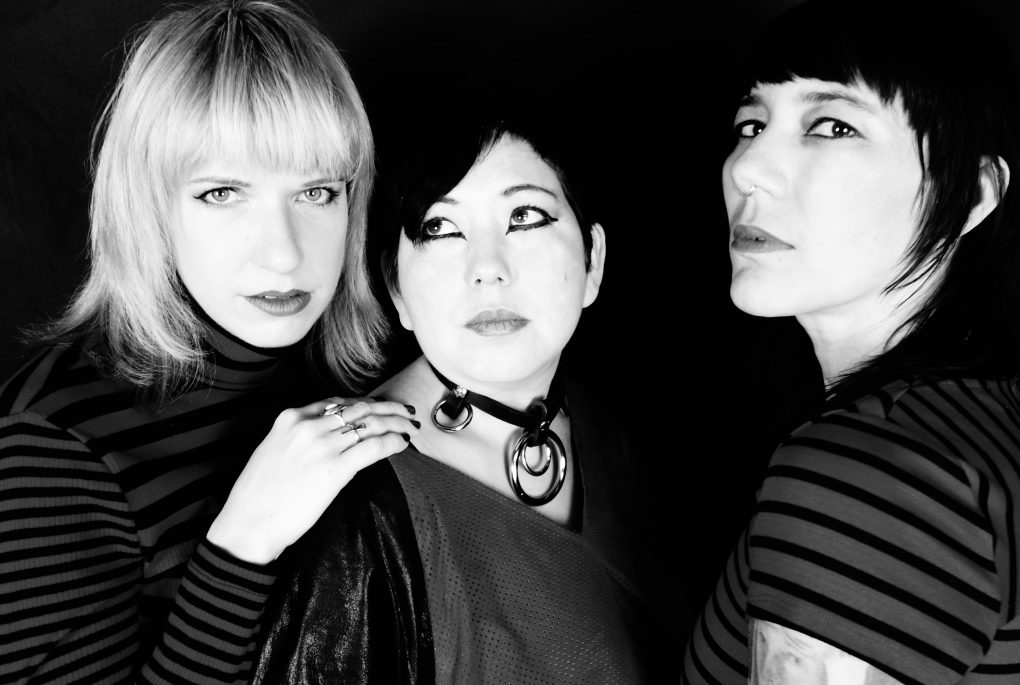
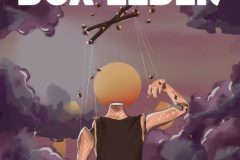
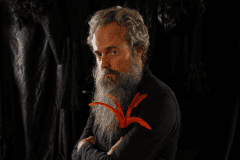
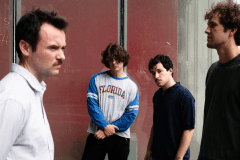
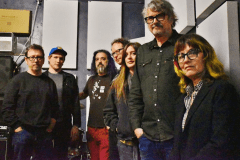

Social Media